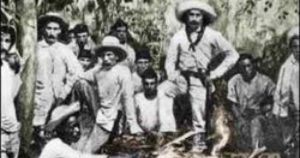MAMBI: THE PROUD WORD THAT TRANSCENDS BORDERS.
Where did the word MAMBI, that with just pride we use to refer to the insurgent in Cuba against Spanish domination? That same word as a noun or as an adjective, used it to authorities and other reactionary elements, at the time of the colonial as a synonym for something very bad: traitor, abominable, enemy, evil, son of mala entraña…
What is synthesized Word Mambi as the term used in Cuba in a pejorative way by Spanish journalism on the island, when it had advanced the war of 1868 and Ignacio Mora reported in a note which said: all the Cuban accepts it less that is called Spanish.
The Patriot camagüeyano wrote their arguments in the insurgent publication El Mambí, organ of the Government of the Republic in arms, who began to edit in Guáimaro, Camagüey, on 7 may 1869.
In the first issue appeared his arguments to make: “Spanish journalism in Cuba wants to make believe – and they ilusionan with the idea – that the revolution has concluded, and in its impotence appeals called the mambises Patriots and other abuse with that thought to offend us…”
In the following numbers it delved into the grammatical aspects of a term that will accompany us forever as a symbol of patriotic pride when the struggle for independence is concerned.
NATIONAL VERSIONS OF OUR PROUD WORD.
There are many and very varied versions about the origin of that term. The scholar Antonio Bachiller y Morales (1812-1889), in “Cuba Primitiva”believed that the voice comes from Santo Domingo, popularized during the revolution against Spain, and adds that in indigenous languages of Brazil means “ear” and called the wild, Maroon, orejanas beasts with the untamed word”
Magazine “college life (March-April 1968) pointed out that the untamed voice means in the lexicon congo dirty, repulsive, vicious, abominable, harmful, vile, cruel man. The Spanish began calling the Dominican rebels with the pejorative term, and then so called the Cuba. Added: “Well, since 1869, to the a el fundar found Ignacio Mora and punishment in Guáimaro the newspaper with the name of”El Mambí”had been awarded a glorious interpretation and since 1876 attribute it to sanctifying”.
Agencies/Cibercuba/Rad.Encyclopedia/J.B.Rodriguez/ Internet Photos / Arnold Varona / TheCubanHistory.com
THE CUBAN HISTORY, HOLLYWOOD.
FOLLOW US ON TWITTER AND FACEBOOK. THECUBANHISTORY.COM
![]() MAMBÍ: ORGULLOSA PALABRA QUE TRASPASA FRONTERAS.
MAMBÍ: ORGULLOSA PALABRA QUE TRASPASA FRONTERAS.
¿De dónde surgió la palabra mambí que, con justo orgullo empleamos para denominar al insurrecto en Cuba contra la dominación española? Esa misma palabra, como sustantivo o como adjetivo, la utilizaban las autoridades y demás elementos reaccionarios, en la época de la colonial, como sinónimo de algo muy malo: traidor, abominable, enemigo, malvado, hijo de mala entraña…
Lo que se sintetiza la palabra Mambí como el término utilizado en Cuba de forma peyorativa por el periodismo español en la Isla, cuando había avanzado la guerra de 1868 e Ignacio Mora denunció en una nota donde afirmó: todo lo acepta el cubano menos que se le llame español.
El patriota camagüeyano escribió sus argumentos en la publicación insurrecta El Mambí, órgano del gobierno de la República en Armas, que empezó a editarse en Guáimaro, Camagüey, el 7 de mayo de 1869.
En el primer ejemplar aparecieron sus argumentos para asegurar: “El periodismo español en Cuba quiere hacer creer -y se ilusionan con la idea- que la Revolución ha concluido, y en su impotencia apela apellidar a los patriotas mambises y a otros dicterios con que cree ofendernos…”
En los siguientes números profundizó en los aspectos gramaticales de un término que nos acompañará por siempre como símbolo de orgullo patriótico cuando de la lucha por la independencia se trate.
VERSIONES NACIONALES DE NUESTRA ORGULLOSA PALABRA.
Son muchas y muy variadas las versiones sobre el origen de ese vocablo. El erudito Antonio Bachiller y Morales (1812-1889), en “Cuba Primitiva “cree que la voz procede de Santo Domingo, popularizada durante la revolución contra España, y agrega que en lenguas indígena de Brasil significa “oreja “y llamaban a las bestias orejanas salvajes, cimarronas, con la palabra mambí”
En la revista “Vida Universitaria (marzo-abril 1968) se señala que la voz mambí significa en el léxico congo hombre sucio, repulsivo, vicioso, abominable, dañino, vil, cruel. Los españoles empezaron calificando con ese peyorativo término a los insurrectos dominicanos, y después llamaron así a los de Cuba. Añade: “Pues bien, ya desde 1869, al fundar Ignacio Mora y Pena en Guáimaro el periódico con el nombre de “El Mambí” le habían adjudicado una interpretación gloriosa y desde 1876 atribuírsela hasta santificante”.
Agencies/Cibercuba/Rad.Encyclopedia/J.B.Rodriguez/ Internet Photos/ Arnoldo Varona/ TheCubanHistory.com
THE CUBAN HISTORY, HOLLYWOOD.






